Short Description : Cognitive SEO
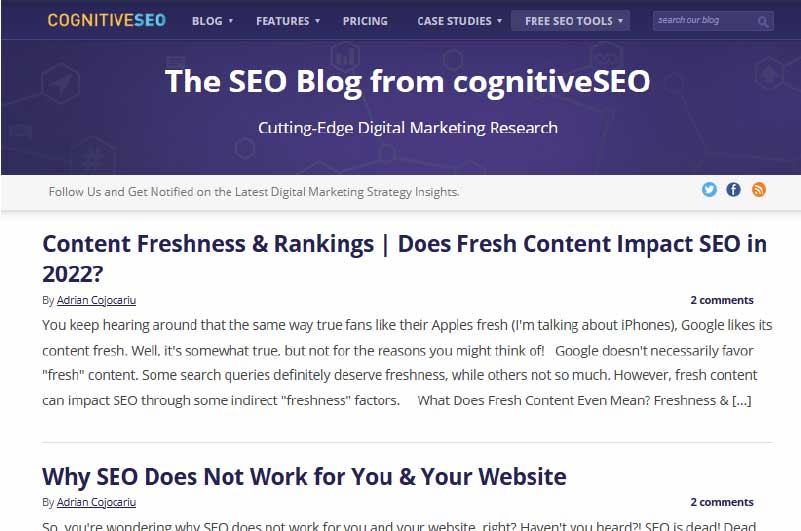
Check out Cognitive SEO’s blog that will help you improve your marketing and SEO knowledge.
Long Description : Cognitive SEO
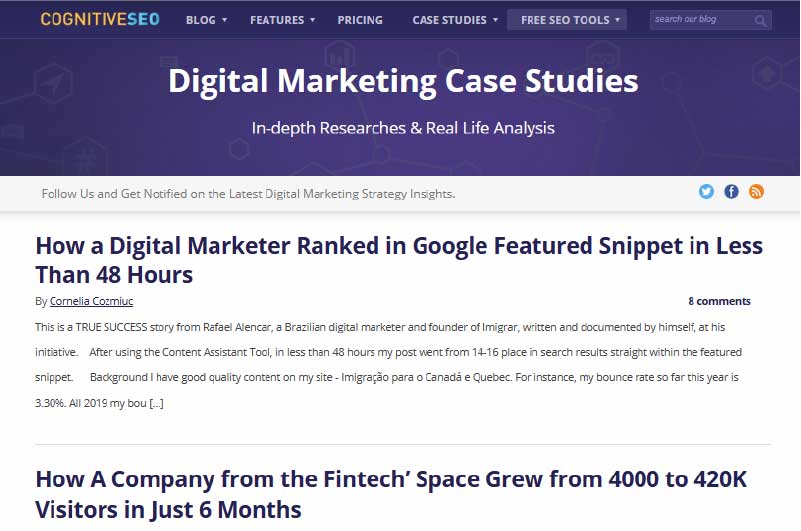
Knowledge platform in natural referencing and digital marketing, the Cognitive SEO Blog brings together a lot of relevant content. These are largely tips, recommendations, and comprehensive guides that form a bountiful source of resources that SEOs and marketers can use.
*
Cognitive SEO Blog
Properly using modern marketing techniques like optimizing websites for search engines requires excellent knowledge in the marketing and SEO industry.
So, if you already have this knowledge but want to improve it, it would be a good idea to arm yourself with more useful techniques, tips and guides. These weapons will give you the resources you need to make a name for yourself in these two sectors.
In order to acquire these famous weapons, you can read blogs really rich in knowledge like the Cognitive SEO blog of which this page is its presentation. Let’s discover this blog together.
Introducing the Cognitive SEO Blog
Most of the articles published on the Cognitive SEO blog are an informative source to stand out in both SEO and digital marketing.
With a simple platform and a variety of easy-to-read editorial writing styles, this blog is definitely one of the must-haves in these two vast digital subsectors.
What do you gain from reading Cognitive SEO blog posts?
Cognitive SEO’s blog features trending and diverse content drawn from cutting-edge digital marketing research. Purely informative, these contents provide you, for example, with crucial data on the various problems that you may encounter on your website.
Better, when you develop a digital marketing strategy, discover through reading the contents of this blog tips to improve yourself even more.
You therefore guarantee:
- excellent productivity in relation to your content marketing strategies;
- better visibility of your services or products;
- quality traffic to your website;
- a good ranking in the SERPs of Google…
It is therefore a blog that is tailor-made for you and for all professionals who, like you, are looking for useful resources to progress in SEO and digital marketing.
But is this blog well visited like that of Diggity Blog? Here are the main metrics we considered.
Top Cognitive SEO Blog Metrics
The metrics of a website make it possible to detect how much it is used. This allows the owner to take steps to improve these measures. In the case of the Cognitive SEO blog, here are the scores.
- Website Authority Score:43
- Average length of visit:10minutes 57 seconds
- Average Bounce Rate:73,78 %
- Monthly Organic Traffic Volume:46,1 k
Note: These are figures collected at the time this description is being written. They are first approximate and are likely to vary over time.
Now you have some idea of Cognitive SEO’s blog metrics. We also suggest that you discover the different categories of this blog since by having an idea of the latter, you can quickly find specific information.
The Ddifferent categories of the Cognitive SEO blog
Many businesses are increasingly moving towards digital marketing. Consequently, it becomes vital for the latter to better position themselves in front of competitors.
So, if you want to improve your knowledge of optimization, you can try to get an idea of the themes and topics developed in the Cognitive SEO blog. Below is what the blog’s 4 categories are all about.
-
Case studies
This first category includes a sufficient amount of case study content on online marketing. This is extensive research, but also real-life analysis from the Cognitive SEO team.
Specifically, you will discover:
- real-life stories from some SEO agencies;
- practical cases on an important event concerning Google;
- case studies to improve the performance of your website…
This easy-to-understand content from real-life experiences can serve as examples or foundations for making significant changes in your business niche.
-
SEO Insights
In the environment of SEO and online marketing, knowing your consumers is crucial.
In reality, it is not always easy to truly understand the intention, desires and needs of a consumer, even with an excellent persona. This is why some marketers struggle to read their leads.
It is therefore up to them and moreover not only to them, but also to SEO professionals to seek and find up-to-date and truly complete advice. That’s what this category is all about.
If you are an SEO professional, you will have material to better understand the impact of SEO through Insights via the tangible blog posts.
Finally, in this category, you will only be confronted with articles-tips and tricks to get more traffic to your website.
Very cool, isn’t it!
-
Social Insights
If you are looking for various information on different content marketing strategies, you can find it in this section. Whether it’s advice or techniques, this category immerses you in an encyclopedic universe.
Articles in this category will be very useful to you in the world of digital marketing. Since by reading only the titles of these articles, you will understand that the category includes tips that will help you improve or review your previous marketing strategies.
-
Software Updates
Last category of the Cognitive SEO blog and exclusively reserved for the Cognitive SEO tool, this is a section that brings together recent updates made to the tool. But it’s also a section that discusses Google’s algorithm updates.
The importance of content in this category lies in the fact that by having some idea of recent updates from Google or Cognitive SEO, followers will be able to use it better. But also, better adapt them to improve the performance of their website.
Moreover, if you wish to have a detailed description of the Cognitive SEO tool, our article may be useful to you. Does the blog have other resources that can be used as a marketing professional? If this question seems relevant to you, you can continue reading for a little more clarification.
Other resources from the Cognitive SEO blog
As an online marketer, the resource available on this knowledge platform that can help you is “Free SEO Tools”.
More specifically, these are three SEO and marketing tools that you can use for free, because we remind you, Cognitive SEO is a suite of marketing and SEO tools with many features such as:
- Content Optimization ;
- Site Audit ;
- Backlink Analysis;
- Marketing Reports or even;
- Penalty Recovery…
Going back to the Free SEO Tools, you should know that it is:
- Site Explorer : for the identification of links in order to identify favorable opportunities for link designs and the analysis of the ranking of your site and that of your competitors.
- Content Optimizer & Keyword Tool: to detect other keyword recommendations and design more optimized content.
- Google Algorithm Changes: for monitoring 170.k+ keywords to spot capital swings in Google.
These free tools from the Cognitive SEO suite seem to form the other resources on the Cognitive SEO blog. But does the latter accept guest articles?
Does the Cognitive SEO blog accept guest posts?
When you take the Cognitive SEO blog, you will realize that the articles published on the blog do not come from the same author. You will see several authors and contributors, however the latter are members of the team. They therefore do not publish guest articles, but articles relating to their area of expertise. Therefore, this blog does not accept guest posts.
In summary
The Cognitive SEO blog is a blog rich in marketing and SEO knowledge. It is subdivided into 4 main categories which are:
- Case studies;
- SEO Insights ;
- Social Insights;
- Software Updates.
Each of the contents grouped in these different sections forms advice, guides, tips that can accompany you in all aspects related to content marketing. It is therefore a blog conducive to bookmarking as a professional in the sector.
Videos : Cognitive SEO
Images : Cognitive SEO

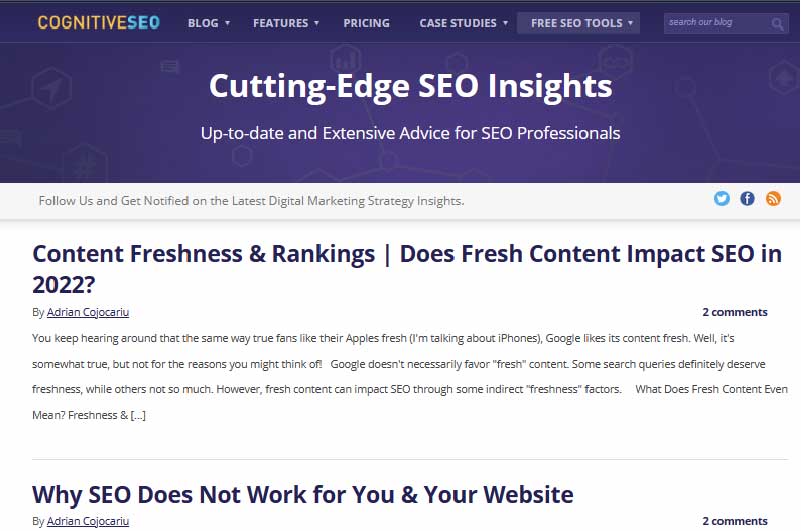
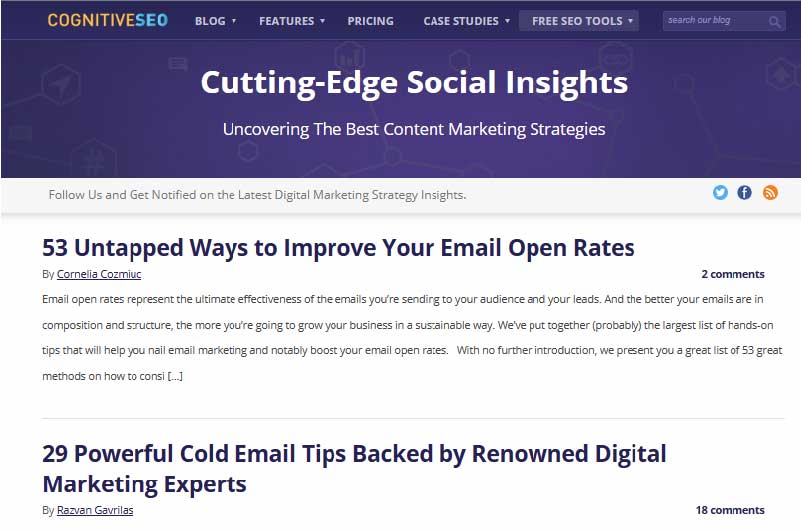
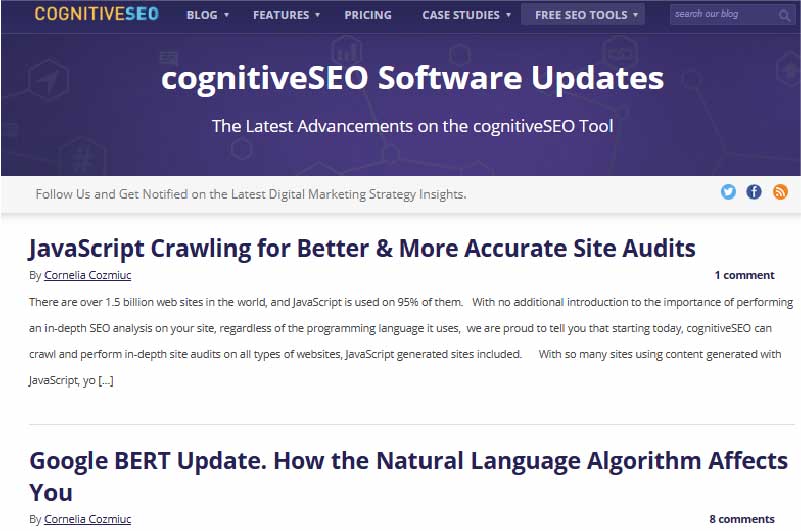
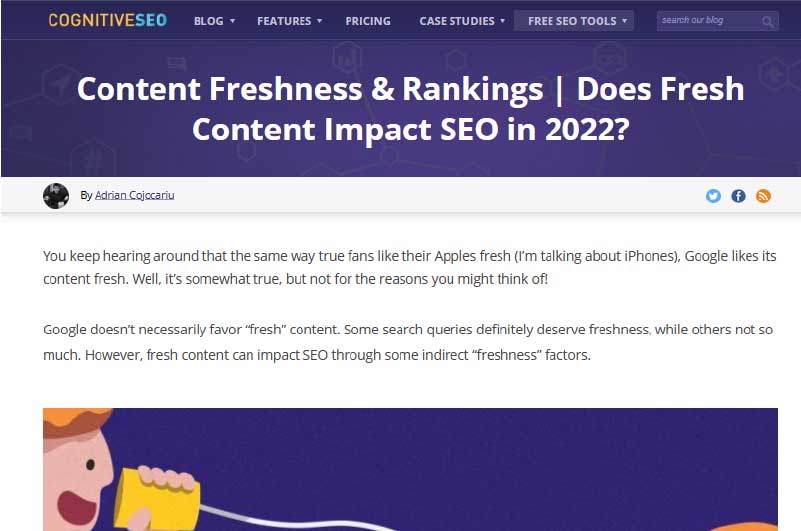
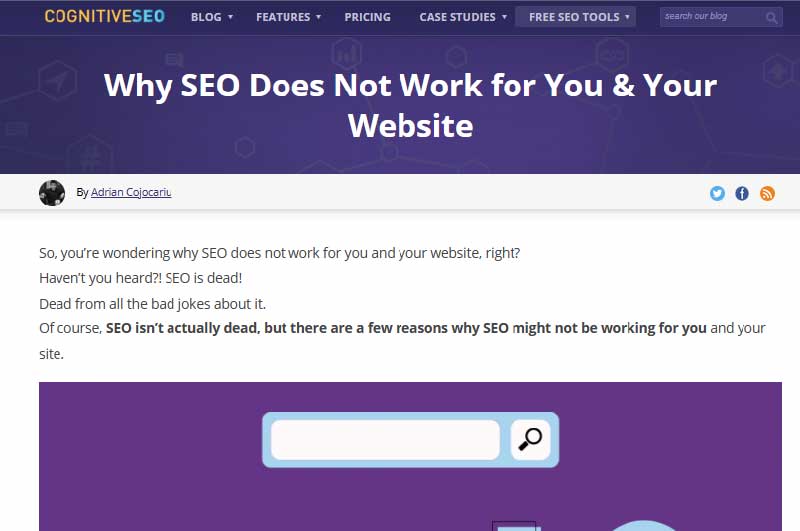
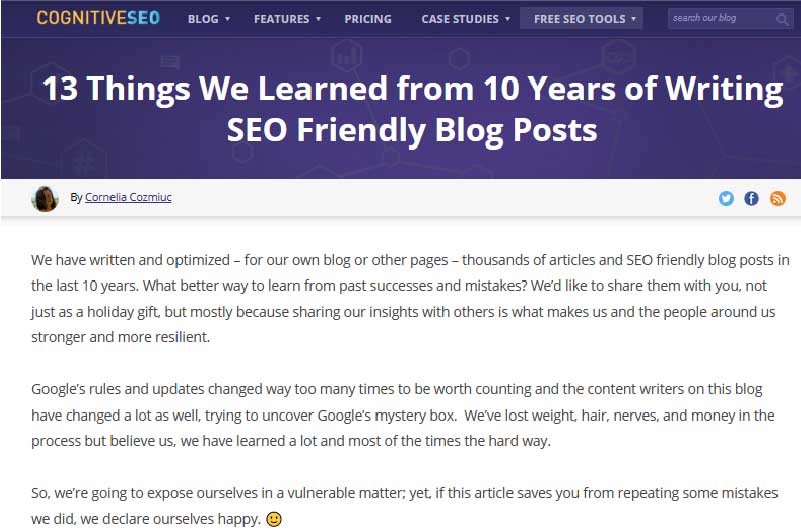
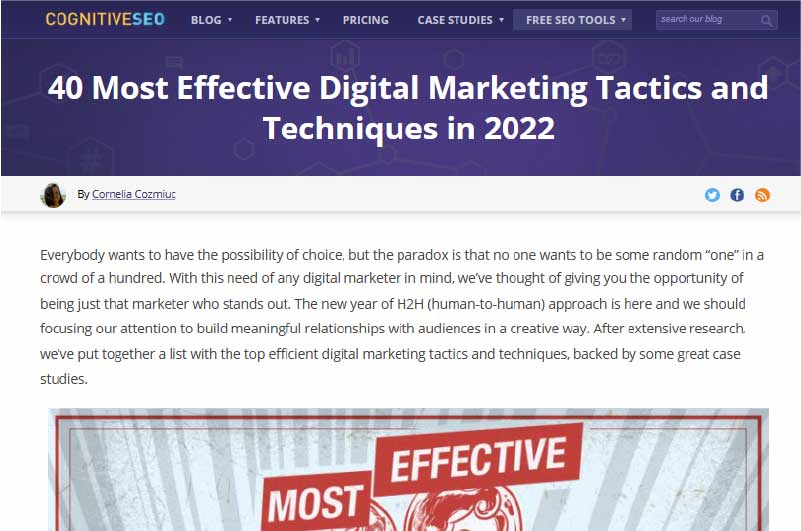
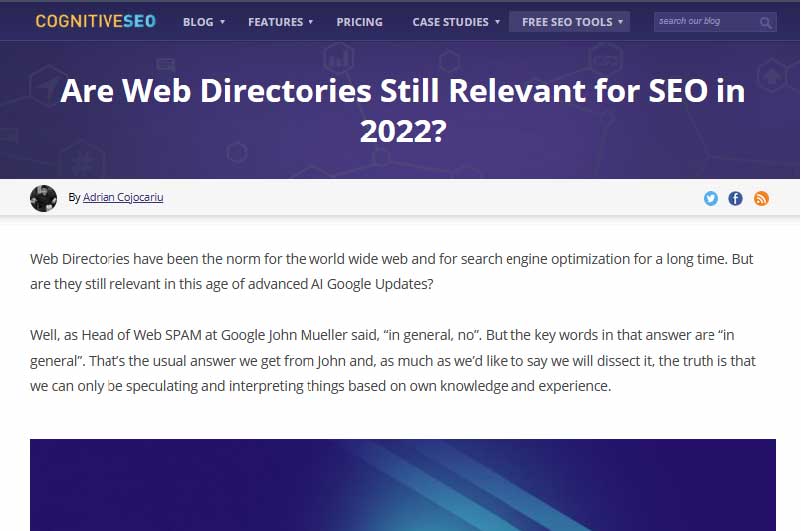
Presentation : Cognitive SEO
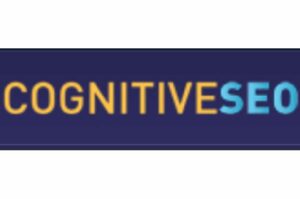
Cognitive SEO is a digital marketing tool that offers comprehensive SEO solutions. The founder and CEO of this platform is Razvan Gavrilas, a specialist with more than 8 years of experience in affiliate marketing and SEO.
Cognitive SEO is made up of a team of experts in digital marketing, SEO and web development.
The company focuses on providing high-quality SEO tools to help businesses improve their rankings.
Cognitive SEO’s goal is to offer all-in-one SEO solutions for businesses. Services offered by cognitiveSEO include:
- Site Explorer : It provides real-time information on newest inbound links, dofollow and nofollow links, domain authority, anchor text, sitewide links, referring domains, as well as broken links and pages .
- Site Audit : This feature analyzes and detects the weak points of your site to know exactly what prevents it from ranking higher in Google. It also helps improve UX and conversion rates.
- Keyword Tool Content Assistant : It provides relevant keyword suggestions to improve content and optimize SEO.
- Signals : this tool monitors more than 170,000 keywords to detect fluctuations. It also tracks old Google updates if you want to see the history of important updates.
Razvan Gavrilas is present on social media, namely:
LinkedIn : Razvan Gavrilas
Twitter : Razvan Gavrilas
YouTube : Razvan Gavrilas
Above Cognitive SEO
Social Network : Cognitive SEO
Others Ressources : Cognitive SEO
 Alexandre MAROTEL
Alexandre MAROTEL
Founder of the SEO agency Twaino, Alexandre Marotel is passionate about SEO and generating traffic on the internet. He is the author of numerous publications, and has a Youtube channel which aims to help entrepreneurs create their websites and be better referenced in Google.
